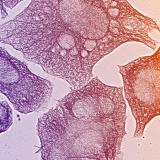The Australian Government is now in caretaker period. During this time, updates on this website will be published in accordance with the Guidance on Caretaker Conventions, until after the election.
RSV is a common virus affecting the lungs and breathing passages. RSV in children usually causes mild to moderate cold-like symptoms lasting from 8 to 15 days. Symptoms include fever, runny nose, coughing and wheezing.
In young children and babies under 12 months old, RSV can cause a chest infection called bronchiolitis. Signs of bronchiolitis include wheezing and difficulty breathing. This may get worse over the first 3 to 4 days before starting to improve. Some children and adults (particularly the elderly) need hospital treatment for their RSV lung infection.
How it spreads
RSV is very infectious. RSV spreads by droplets in the air that contain the virus or direct contact with mucus or saliva. People get infected by:
- breathing in droplets when an infected person breathes, coughs or sneezes on them
- touching a surface contaminated with droplets – for example, hands, tissues, toys or eating utensils – and then touching their eyes, nose or mouth.
The virus can live on surfaces for several hours, and on unwashed hands for up to an hour.
Infected people usually develop symptoms 5 days after exposure to the virus. This can range from 2 to 8 days. People with RSV can usually pass the virus to others for 8 days from the start of their symptoms.
Exclusion period
If a person has respiratory symptoms (cough, sneezing, runny or blocked nose, sore throat), exclude them only if:
- the respiratory symptoms are severe or
- the respiratory symptoms are getting worse (more frequent or severe), or
- they also have concerning symptoms (fever, rash, tiredness, pain, poor feeding).
Otherwise do not exclude.
A person often has an ongoing cough after they have recovered from a respiratory infection. If their other symptoms have gone and they feel well, they can return to the service.
Actions for educators
Follow the exclusion period in the Staying healthy guideline.
Ensure staff and children have good respiratory and hand hygiene.
Ensure staff use appropriate cleaning practices, as described in the Staying healthy guideline.
If you have several cases of flu-like illness in your service, contact your public health unit for advice.
Actions for parents and carers
Keep your child at home until their symptoms have gone and they feel well. If your child still has a cough, but their other symptoms have gone and they feel well, they can return to the service.
Teach your child to cough or sneeze into a tissue, then throw the tissue into a bin and wash their hands. If there are no tissues nearby, teach them to cough or sneeze into their inner elbow instead of their hands.
Clean surfaces that your child has touched, sneezed on, or coughed on to reduce the risk of the infection spreading to others at home.
More information about RSV
See healthdirect for more information on prevention, diagnosis and treatment of RSV.
To find out if a child needs medical help, you can:
- use the health direct online symptom checker
- speak to a registered nurse by calling their 24-hour health advice hotline on 1800 022 222.


